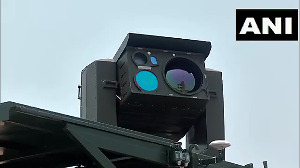Vasan Bala's ability to jolt our Bollywood conditioned brains into experiencing new forms of menace, showcasing Alia in a savage new light, wins Sukanya Verma's dil and jigra.

Vasan Bala creates worlds that may appear deceptively similar to the ones you and I inhabit but run entirely on their own terms and whimsy.
It's a part of the film-maker's charm and cinephile influences, which made the likes of Mard Ko Dard Nahi Hota and Monica O My Darling such a treat.
Jigra, probably his most big-ticket project so far, is also his most sombre.
More than nods to pop culture moments, he internalises one of its biggest icons, Amitabh Bachchan, as both emotion and grammar.
Bachchan, on whose 82nd birthday the movie releases, is Jigra's language, inspiration, attitude and plan B.
But Bala is going more for the man's simmer than swagger and the representative of those angry young ideals is not some towering masculine figure but a pocket-sized Alia Bhatt determined to bring her incarcerated brother back home.
Co-produced by her and big sister Shaheen along with Dharma Productions, Jigra's prison break bravado can be best described as Bachchan, Alia Bachchan spearheading Vasan Bala's Bangkok Hilton sans the bullshit but tons of bedlam.
Back in 1993, Dharma made Gumrah directed by Alia's dad Mahesh Bhatt, which rehashed the afore-mentioned Nicole Kidman mini-series to chronicle Sridevi's misery behind bars after she's falsely implicated on drug trafficking charges by the unsympathetic Hong Kong police until rescued in true blue Bollywood fashion by Sanjay Dutt.
Bala, on the other hand, does away with all the melodrama and violence to craft a slick escape thriller around a sibling dynamic that plays out the nightmare for what it is against a growing atmosphere of dread.
Orphaned at a young age, witness to her father's suicide and a possible survivor of abuse that's more insinuated than publicised, Alia is Satya but her truth stems from her belief not honesty.
She's like a helicopter sister sworn to protect her brother at all costs, which makes her a bit of a bully. But when you see the results of not paying heed to her warning, it doesn't seem all that unwarranted.
There's a frostiness in her manner, a disinterest to engage and hints of bulimia. Yet, she transforms into a bulldog, a Bachchan, a brother's sister when her sibling is thrown in harm's way.
Satya and her kid brother Ankur (Vedang Raina) seem to be big on Kuch Kuch Hota Hai, as evident in their basketball court rivalry and mention of summer camp like a little in-joke only enthusiasts of Karan Johar's directorial debut will understand.
Alas, the camaraderie is short-lived when Ankur finds himself sentenced to death row in a fictional foreign land that sounds a lot like China.
Fed on Agneepath's law of the jungle ideology, Aakhri Raasta's reckless interpretation of last-ditch effort, Zanjeer's do or die grit, Satya resolves to resort to Bachchangiri and get her not guilty brother out of jail by hook or crook.
Where there's a way, there's also a warden and the Indian-origin jailer Landa's (a forbidding Vivek Gomber in want of better fleshed-out villainy) stickler for rules, hellbent on wielding a Gupt-style danda on the boy.
Satya, on the other hand, finds friends in fellow sufferers, kind of like Bachchan's Om Prakash and Pran, played by an excellent Manoj Pahwa and a compelling Rahul Ravindran as they devise impractical ways to come and rescue the 'bachchas'.
It's a bonkers plan and the likelihood of its success is slim but the ever solid Pahwa humours Jigra's players on screen and behind it in ways that satisfies our need to see the innocent freed.
Bala's systematic depiction of the humiliation and horror in the lockup, which teases our Gumraah/Anjaam/Ek Hasina Thi-fuelled fear for scenes of physical violence but spares us the discomfort.
Instead, jump scares take the face of bizarre interventions that make little sense if one wasn't so preoccupied by Alia's fearless action and Vedang's lamb face.
There's not much scope for Bala's trademark quirk in Jigra's raging pursuits except for the cameos from his earlier collaborators and a wild, unhinged climax that mishmashes everything from Zanjeer's ode to friendship to cries of long live the revolution.
Cinematographer Swapnil S Sonawane soaks the scenes of struggles between the siblings in shades of dull orange and bleak blue, powered by Achint Thakkar's sentimental score and rambunctious background music.
There are times when Vasan Bala's indulgences rob the momentum of its steam and devil-may-care heroics prevail over good sense.
But his ability to jolt our Bollywood conditioned brains into experiencing new forms of menace, turning a John Woo-style prison riot into a Chinese Communist movement and showcasing Alia in a savage new light won my dil and jigra.













 © 2025
© 2025